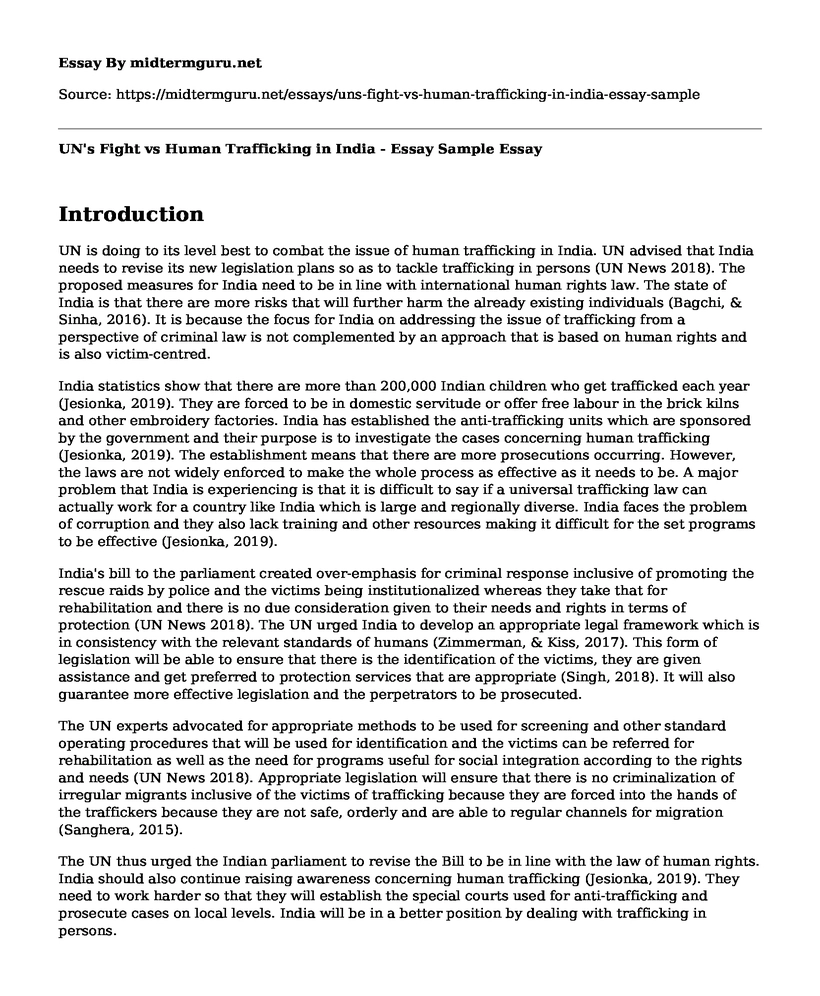Introduction
UN is doing to its level best to combat the issue of human trafficking in India. UN advised that India needs to revise its new legislation plans so as to tackle trafficking in persons (UN News 2018). The proposed measures for India need to be in line with international human rights law. The state of India is that there are more risks that will further harm the already existing individuals (Bagchi, & Sinha, 2016). It is because the focus for India on addressing the issue of trafficking from a perspective of criminal law is not complemented by an approach that is based on human rights and is also victim-centred.
India statistics show that there are more than 200,000 Indian children who get trafficked each year (Jesionka, 2019). They are forced to be in domestic servitude or offer free labour in the brick kilns and other embroidery factories. India has established the anti-trafficking units which are sponsored by the government and their purpose is to investigate the cases concerning human trafficking (Jesionka, 2019). The establishment means that there are more prosecutions occurring. However, the laws are not widely enforced to make the whole process as effective as it needs to be. A major problem that India is experiencing is that it is difficult to say if a universal trafficking law can actually work for a country like India which is large and regionally diverse. India faces the problem of corruption and they also lack training and other resources making it difficult for the set programs to be effective (Jesionka, 2019).
India's bill to the parliament created over-emphasis for criminal response inclusive of promoting the rescue raids by police and the victims being institutionalized whereas they take that for rehabilitation and there is no due consideration given to their needs and rights in terms of protection (UN News 2018). The UN urged India to develop an appropriate legal framework which is in consistency with the relevant standards of humans (Zimmerman, & Kiss, 2017). This form of legislation will be able to ensure that there is the identification of the victims, they are given assistance and get preferred to protection services that are appropriate (Singh, 2018). It will also guarantee more effective legislation and the perpetrators to be prosecuted.
The UN experts advocated for appropriate methods to be used for screening and other standard operating procedures that will be used for identification and the victims can be referred for rehabilitation as well as the need for programs useful for social integration according to the rights and needs (UN News 2018). Appropriate legislation will ensure that there is no criminalization of irregular migrants inclusive of the victims of trafficking because they are forced into the hands of the traffickers because they are not safe, orderly and are able to regular channels for migration (Sanghera, 2015).
The UN thus urged the Indian parliament to revise the Bill to be in line with the law of human rights. India should also continue raising awareness concerning human trafficking (Jesionka, 2019). They need to work harder so that they will establish the special courts used for anti-trafficking and prosecute cases on local levels. India will be in a better position by dealing with trafficking in persons.
References
Bagchi, M. S., & Sinha, A. (2016). Human Trafficking in India: Theoretical Perspectives with special reference to the Human Trafficking scenarios in The North Eastern Part of India. International Journal of Research in Economics and Social Sciences (IJRESS), 6(9).
Jesionka, N., (2019) what's being done to stop human trafficking? Retrieved from https://www.themuse.com/advice/whats-being-done-to-stop-human-trafficking
Sanghera, J. (2015). Unpacking the trafficking discourse. In Trafficking and prostitution reconsidered (pp. 45-66). Routledge.
Singh, B. (2018). Regulatory Framework for the Human Organ Trafficking in India. Indian Journal of Health & Medical Law, 1(1), 5-8.
UN News (2018), UN experts urge India to align the new anti-trafficking bill with human rights law. Retrieved from https://news.un.org/en/story/2018/07/1015352
Zimmerman, C., & Kiss, L. (2017). Human trafficking and exploitation: a global health concern. PLoS medicine, 14(11), e1002437.
Cite this page
UN's Fight vs Human Trafficking in India - Essay Sample. (2023, Feb 08). Retrieved from https://midtermguru.com/essays/uns-fight-vs-human-trafficking-in-india-essay-sample
If you are the original author of this essay and no longer wish to have it published on the midtermguru.com website, please click below to request its removal:
- The Role of Evidence in Forensic Science: Paper Example
- Paper Example on Killing: An Ethical Perspective
- Introduction to Public Opinion and Propaganda - Research Paper
- Discrimination in the US: A Historical Persistence Since Founding - Essay Sample
- Media: Watchdog of the Political Elite or Manipulator of Civil Sectors? - Essay Sample
- From Army Service to Supervising Prisoners: My Career in Corrections - Research Paper
- News Example: 2 Men Charged in Minneapolis Triple Slaying







